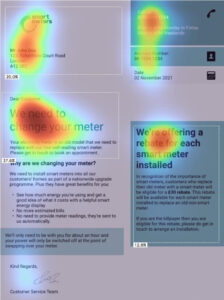Consumer Duty Part 2: Testing Communications
Posted: 06/01/2023


What is consumer understanding?
The FCA’s new rules on Consumer Duty will come into effect from July 2023. One of the four main outcomes the FCA wants from the new rules focuses on consumer understanding. The communications between financial institutions and consumers must leave consumers able to make informed decisions about financial products and services. Communications must be fair, clear, timely and not misleading.
Why is consumer understanding difficult to measure?
Determining how well customers understand banks’ communications about financial products is more difficult than it may initially seem. Asking people how well they understand communications via a survey doesn’t work, because people often don’t know how well they understand something 1 , and they skew their responses towards what they believe is more socially desirable 2 . Surveys also disregard the importance of context, and the context in which someone sees information has critical influence over how a customer will understand that information 3 .
What can Dectech do to help?
In response to the challenges of properly exploring consumer understanding, we use our BehaviourLab communications testing paradigm. BehaviourLab is an immersive, online behavioural experiment platform which replicates the real world environment in which consumers are making decisions as closely as possible.
When we run a BehaviourLab experiment, we design an online replica of the communication we are testing. The new Consumer Duty covers all consumer communications, all of which can be created in BehaviourLab. These include verbal conversations, videos, and product terms and conditions alongside letters and webpages. We then carefully recruit our participants so that the communication is tested on a representative sample of consumers. We can also specifically recruit vulnerable consumers, who are a particular focus of the new Consumer Duty. Finally, we record and analyse participants’ responses and behaviour, and we use the data to identify issues with consumer understanding, and provide constructive, actionable feedback on how communications could be improved.
We believe that our BehaviourLab communications testing approach is the best way to measure consumer understanding. It is already being used to help our financial services clients to meet the requirements of the Consumer Understanding outcome from the FCA’s new Consumer Duty rules. Do get in touch if you would be interested in speaking with us about how Dectech could help to test your institution’s communications.
Figure 1: Dectech Comms Testing example output

1. Dunning, D. (2011). The Dunning-Kruger Effect: On Being Ignorant of One’s Own Ignorance. In J. M. Olson, & M. P. Zanna (Eds.), Advances in Experimental Social Psychology (Vol. 44, pp. 247-296). Cambridge, MA: Academic Press.
https://doi.org/10.1016/B978-0-12-385522-0.00005-6
2. Grimm, P. (2010). Social Desirability Bias. In J. Sheth, & N. Malhotra (Eds.), Wiley International Encyclopedia of Marketing. Hoboken, NJ: John Wiley & Sons.
https://doi.org/10. 1002/9781444316568.wiem02057
3. Davis, R., Campbell, R., Hildon, Z., Hobbs, L., & Michie, S. (2015). Theories of behaviour and behaviour change across the social and behavioural sciences: a scoping review. Health psychology review, 9(3), 323–344. https://doi.org/10.1080/17437199.2014.941722